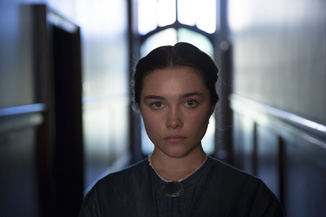|
|
The 400-Word Review: Lady MacBethBy Sean CollierAugust 2, 2017
The historic fantasy devolves into a master class in shock and depravity, then, as Katherine is driven to actions much more bloody and bold with every passing day. In this regard, Lady Macbeth is an interesting experiment; what do you make of a film that contains only antagonists? Katherine is not a hero of any kind, and the rest of the cast are similarly flawed, save a few pure victims. It’s a fascinating way to tell a story; rob the audience of any rooting interest and an odd purity emerges. Alice Birch’s screenplay, adapting the 19th-century Russian novella “Lady Macbeth of the Mtsensk District,” moves swiftly and sparsely. Yet this is a film that simultaneously bathes in the inherent romance of its setting — the wind sweeping across fields, flickering light cast against bare walls — and rebels against it, upending a longstanding literary fantasy. Early moments will recall Jane Austen; the film’s conclusion will dash that comparison even more thoroughly than that zombie adaptation managed. Yet, for the strong-willed audience, there is plenty here. My Rating: 8/10 Sean Collier is the Associate Editor of Pittsburgh Magazine and a member of the Broadcast Film Critics Association. Read more from Sean at pittsburghmagazine.com/afterdark
[ Read more 400 word movie reviews ]
[ View other movie reviews ]
[ View other columns by Sean Collier ] [ Email this column ]
|

|
|
|

|
Thursday, October 31, 2024
© 2024 Box Office Prophets, a division of One Of Us, Inc.


